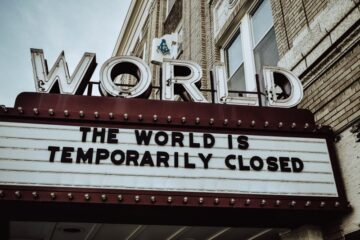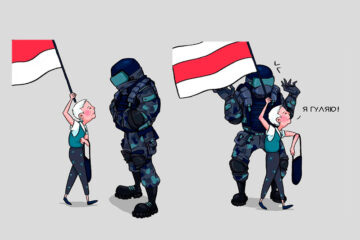The International Women’s Day has been celebrated on March 8th since 1909. It was established in honor of women fighting for their rights in the USA. At the beginning of 20th century this day was celebrated mostly in communistic countries. But in 1975 the United Nations recognized the holiday as well. In Russia (my home country) people started celebrating this day after the Revolution in 1917. Till now this is one of the biggest Russian public holidays.
For the last half an year I’ve met women from around the world and I realized how lucky I was to be born in Russia where women have the same rights as men (of course there are some gender issues like home violence or sexual harassment). Unfortunately, the situation with women’s rights is not similar around the world. So I decided to tell you about a few movies based on true stories that tell us about social issues women face around the world right now.
If you want to learn more about the fight for women’s rights in early 1900 — when the holiday was established — I encourage you to watch the movie “Suffragette” (2015). At the beginning of the 20th century, people called women who fought for voting rights as “suffragette” (from the word “suffrage” which means “right to vote”).
Desert Flower (2009) & Female Genital Mutilation
Desert Flower is a movie based on a true story of Waris Dirie, top model, actress, and social activist from Somalia. Waris played in a James Bond movie, participated in advertising campaigns for Chanel, L’Oreal, and Levi’s, and became a world-famous top model at the same time as Naomi Campbell. But the movie shows Waris’s life before her worldwide recognition.
When Waris was a small girl she went through the ritual of female genital mutilation (FMG). Currently, according to the UNICEF data, around 200 million women and girls went through this practice worldwide. Most of them live in African countries, but also, this ritual is “popular” in some parts of Asia and the Middle East. FMG practice is not only an issue with gender inequality, but this harmful practice affects women physically and emotionally.
In 2002 Waris Dirie founded the Desert Flower Foundation to fight against this awful ritual and raise awareness about the consequences after FMG. Also, she served as a UN Special Ambassador against FMG for 6 years.
Love Sonia (2018) & Worldwide Sex Trafficking
Love Sonia is one of the scariest movies I’ve ever seen. It tells us about a huge human-trafficking around the world and especially about underground international sex trafficking. The story of a young girl Sonia is based on the real case. In 2003 a marine container with a few girls who were shipped from China to work as prostitutes founded in the Los Angeles marine port.
The movie was created with the help of the leading anti-trafficking NGOs, such as the UN Office of Drugs & Crime (UNODC), APNE AAP Women Worldwide, and Coalition to Abolish Slavery and Trafficking (CAST).
According to the UNODC Global Report on Trafficking, 72% of all victims of international trafficking are women and girls. Most of the time they are used for sexual exploitation. But even 35% of victims of labor-trafficking are women. The UN International Labour Organization estimates around 4.8 million people (mostly women and girls) were forced into sexual exploitation worldwide annually (learn more from the UNILO Global Report). But what is the scariest thing is that the most trafficking carried out by people with the same nationalities as their victims!
Splash (2020) & Acid Attacks
The Splash (or “Chhapaak” in Hindi) movie was released in January 2020. As in previous cases, this movie is based on a true story of Laxmi Agarwal who survived after an acid attack performed by a man she refused to marry. After the attack, Laxmi became a social activist fighting for tackling the problem with acid attack. Moreover, she performed as a director of the Indian Chhanv Foundation fighting against acid attacks and supporting the attack survivors. Thanks to Laxmi, the Supreme Court of India worked out a new strict regulation on buying and selling acid. Unfortunately, these restrictions still are not implement widely in the country.
For the last 5 years, there have been around 1,200 cases of acid attacks in the world. Most of them were performed in India, Pakistan, China, and Bangladesh, but also in Italy and the UK! According to the UK-based NGO Acid Survivors Trust International (ASTI), up to 80% of all acid attacks’ victims are women. This shows us the level of women’s discrimination in the world.
The Stoning of Soraya M. (2008)
The Stoning of Soraya M. movie tells us a story of an Iranian village woman named Soraya who was stoned to death for “adultery”. Actually, there was no adultery by Soraya, her abusive husband just wanted to marry a young girl and reported about an “adultery” by his wife. The movie is based on a novel La Femme Lapidée of French-Iranian writer and journalist Freidoune Sahebjam. The book tells us a true story about Iranian woman Soraya Manutchehri who was stoned to death for adultery in 1986. The novel was published in 1990 and was banned in Iran. And almost 20 years later it was adapted to the movie.
Unfortunately, stoning for adultery of married persons is still LEGAL in a few countries in the world, such as Saudi Arabia, Yemen, Iran, Sudan, and Somalia. Also, there were registered reports of stoning in Afghanistan while it’s forbidden there by the law. According to the Amnesty International data, most stoning executions are performed against women. The main reason for this disproportionate impact on women is because women have less rights and respect in society than men in most of those countries, they are poorer and can’t afford a good legal help. Moreover, most women in rural areas do not speak Persian—the official language of courts—and can’t defend themselves! Learn more about the punishment of death by stoning at the Amnesty International Global Report.
Thumbnail Photo by Lindsey LaMont on Unsplash



